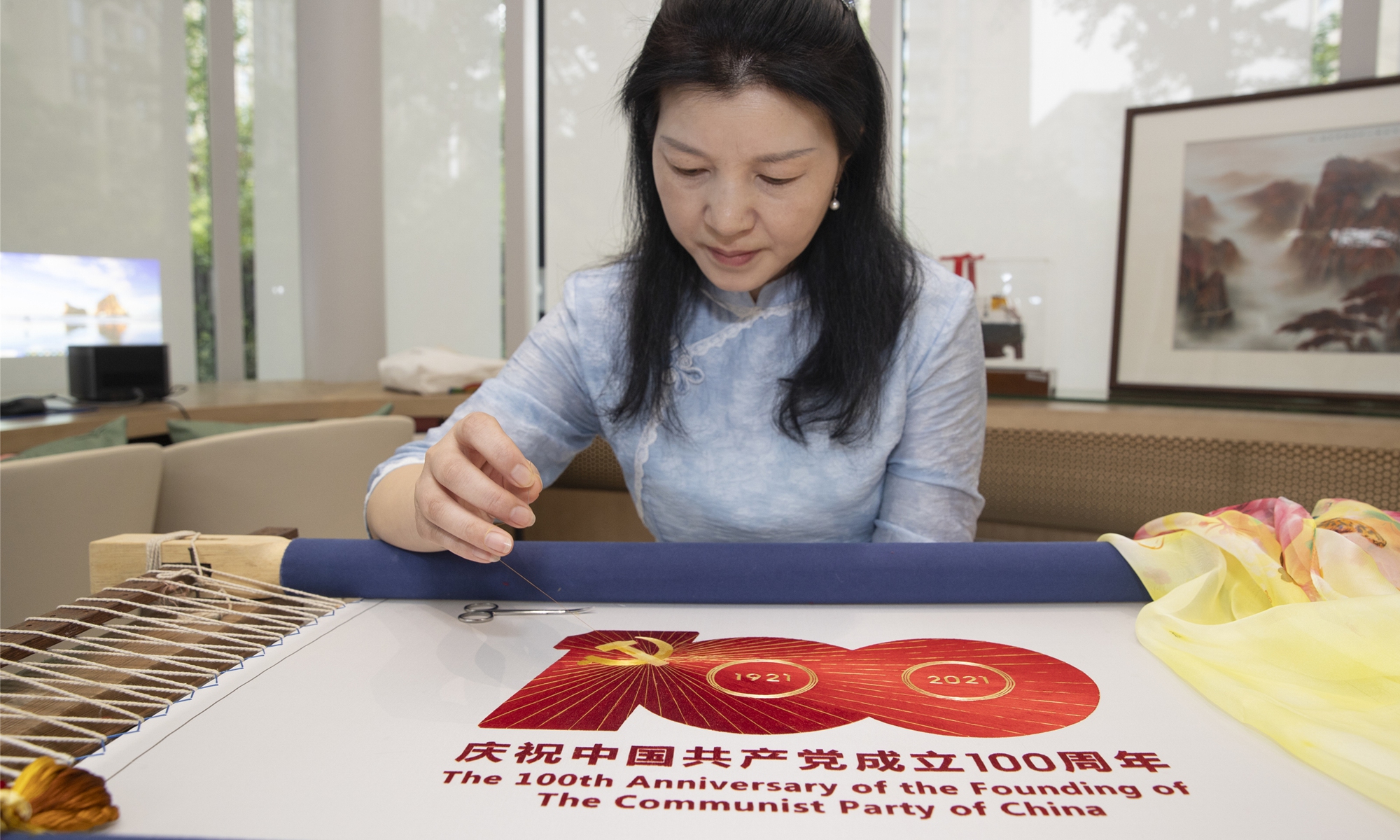CPC leadership leads to stronger, more efficient business sector
Party building moves to high gear

An artist embroides the celebration logo for the 100th anniversary of the founding of the CPC at a Party services center in Wuxi, East China's Jiangsu Province on June 19. Photo: cnsphoto
The centennial of the Communist Party of China (CPC) is approaching and a grand celebration will be held on July 1. The 100th anniversary marks an important milestone in the CPC's leadership, which has helped build the world's most populous country into the world's second-largest economy, and created a model of corporate governance that has injected a new dynamic into China's vibrant business environment.
The CPC's stewardship is also playing an increasingly important role in corporate management of large companies. Many - regardless of private, state-owned or foreign-invested firms - have established Party branches and committees, helping them improve operating efficiency, address tech bottlenecks and create more value for the society.
As more and more young people join CPC, the Party branches within corporations are shining with new vitality.
A long host of companies employ high-tech measures, such as developing Party building app and using Wechat mini-programs, to help young Party members form a deep understanding of the history of CPC in their leisure time, elevate corporate cohesion and form a sense of responsibility.
As of the end of 2019, 1.48 million enterprises and 142,000 social organizations have set up Party committees at the grass-root level, according to a report by the Organization Department of the Communist Party of China's (CPC) Central Committee.
Learning CPC history
In 2018, e-commerce platform Suning developed internal Party-building app and official Party-building Wechat account. Those platforms provide its vast workforce of delivery workers with themed Party-building activities including watching patriotic films, reviewing the Party admission oath and visiting "red tourism" sites online.
A spokesperson of Suning told the Global Times on Monday that Suning has also launched a pilot "open-ended Party branch" in Nanjing, capital of East China's Jiangsu Province, to regularly organize online Party knowledge learning lessons and strengthen Party management in daily operations.
The pilot Party branch now has 86 CPC members, who are all deliverymen. And, 31 other delivery workers have filed Party membership application to the committee.
The spokesperson noted that those Party members have played an exemplary and vital role in delivering efficient and high-quality service to customers. Their outstanding services have led to extra bonuses and commission fees, boosting their monthly incomes by more than 20 percent.
High performers were also promoted from frontline workers to management positions in logistics firm after multifaceted training, the spokesperson said, noting that modern Party building has created a "virtuous cycle" in the company's operation.
In addition to developing apps, some Chinese tech firms have used augmented reality (AR) technology to present young workers with the revolutionary legacy of CPC. Chinese artificial intelligent start-up SenseTime has partnered with Shanghai branch of China Post to roll out a special postcard named "tracking the 'red' footprints of Shanghai" - based on AR and Radio Frequency Identification technologies.
After scanning QR code at the postcards and projecting it at designated sites, visitors will be able to see three-dimensional sightseeing routes and special vehicles that travelled through the site, a spokesperson of SenseTime told the Global Times.
The AI firm has also worked with the memorial hall of the first National Congress of the CPC in Shanghai to launch a collection of special souvenirs: bottles of drinking water installed with AR-driven application.
Visitors will be able to watch a video illustrating the meeting - where 12 delegates representing about 50 CPC members secretly convened the first CPC national congress in July 1921 - after scanning the QR code.
"It will help visitors immerse in the atmosphere and vividly remind them of how CPC was born," the spokesperson said.
Translating to innovation drives
For tech companies and research institutes, Party-building activities have generated a more profound effect, spurring their perseverance in tackling with formidable tasks and inspiring them to "conquer" technological difficulties.
From April to June, Global Energy Internet Research Institute, a subsidiary of State Grid Corporation of China that specialized in the research and development (R&D) of critical technologies and equipment in energy internet industry, has launched an online "re-walking the Long March" Wechat mini-program, allowing its Party members to trek the footsteps of the Central Red Army from Ruijin, East China's Jiangxi Province, to Huining, Northwest China's Gansu Province, where front armies finally joined forces and the Long March successfully reached its conclusion.
Steps taken are recorded in each user's Wechat Movement, a fitness tracker mini program developed by Wechat, matching the steps users take in the virtual Long March journey.
An Chunyan, the company's Party branch head, said that many CPC members feel excited to participate in the activity, which in turn strengthens their patriotism.
"Times may be different, but the careers of us - as CPC members - have never changed. As a frontline research staff, there are plenty of 'snow mountains' and 'grasslands' to conquer. We need to stay true to the Party's original aspiration and the founding mission, and we shall fully take our responsibility in the 'new Long March,'" An said.
According to An, tech-based Party building has helped to advance the company's innovation efforts.
The company's research team, with an average age of 38-years-old, has recently made breakthroughs in the R&D of materials of homegrown high voltage direct current cables, technologies which have long been dominated by foreign companies.
"As China is about to celebrate the 100th anniversary of CPC, every technologist in China shall treasure and inherit the Nanniwan spirit, a legacy which has always inspired Chinese to tackle economic hardships and achieve self-sufficiency," a spokesperson from Shenzhen-based AI robot company UBTech Robot, told the Global Times.
"Under the leadership of CPC, it's our mission to take the lead in devoting ourselves to tech R&D to guard against complicated international situation," she added.



